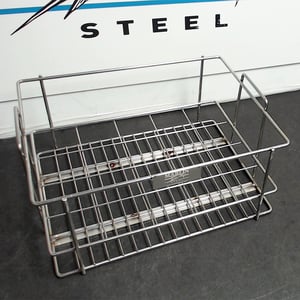 Stainless steel is a popular choice for product handling in the pharmaceutical industry. In general, stainless steel is durable, able to withstand exposure to many of the chemicals used to sanitize pharmaceutical products, and has a high temperature tolerance to withstand heat-based sanitation methods. However, there are many different stainless steel types and uses for the pharmaceutical industry.
Stainless steel is a popular choice for product handling in the pharmaceutical industry. In general, stainless steel is durable, able to withstand exposure to many of the chemicals used to sanitize pharmaceutical products, and has a high temperature tolerance to withstand heat-based sanitation methods. However, there are many different stainless steel types and uses for the pharmaceutical industry.
Different types of stainless steel are used for different applications in the pharmaceutical industry. Some “stainless steel common uses” for the pharmaceutical industry include:
- Parts-washing baskets
- Product-processing containers
- Biosample processing
- Sanitary product handling
- Sample incineration/disposal
Which stainless steel should you use? Here are descriptions of different grades of stainless steel and how they can be used in the pharmaceutical industry:
Grade 304 Stainless Steel Properties and Uses
Grade 304 stainless steel is one of the most common formulations of stainless steel on the market. It is often used in parts washing applications because of its high resistance to chemical corrosion.
This stainless steel type is also used for surgical instruments, and is referred to as “surgical stainless steel” by some because of its ability to resist oxidation and how easily it can be cleaned and sterilized.
Compared to some other varieties of stainless steel, 304 SS has solid all-around performance for a (comparatively) modest cost—but it isn’t always the best option. Chlorides can degrade the metal, causing pitting corrosion that impairs its performance.
Grade 316 Stainless Steel Properties and Uses
Next in the 300 series of austenitic stainless steels is grade 316 SS. This variety of steel contains more nickel and molybdenum than grade 304 SS does, which helps to enhance the metal’s resistance to pitting corrosion from exposure to chlorides (such as salt).
In general, 316 stainless steel is used in cookware and naval applications, and in the pharmaceutical industry, it can be used for almost any application. It is often preferred for sample and materials handling applications where saline solutions or similarly salty chemicals may come into contact with the metal.
It is also useful for high-temperature sanitation processes, as it has a maximum continuous use temperature around 800˚C (1,472˚F)—more than enough to kill microbial agents and sanitize the surface of the steel.
A variant of this steel, called 316L, is a low-carbon version of the alloy that has enhanced resistance to corrosives and improved weldability at the cost of some tensile strength. In many pharmaceutical manufacturing applications, 316L is preferred to 316 stainless steel because the difference in tensile strength is negligible.
What about Ferritic and Martensitic Stainless Steels?
Ferritic and martensitic stainless steels are less popular for pharmaceutical manufacturing than austenitic varieties such as grade 304 and 316 SS. This is largely because of their lower nickel content compared to austenitic stainless steel alloys (which makes them more susceptible to corrosion).
Additionally, ferritic alloys are magnetic, which may pose a problem for some equipment (though it may also be desirable for certain processes).
Improving the Usefulness of Stainless Steel for Pharmaceutical Applications
While stainless steel with a natural finish is certainly useful for pharmaceutical applications, it is often preferable to electropolish the steel. Electropolishing stainless steel strips away its surface layers, removing tiny flaws and leaving a microscopically-smooth finish.
By electropolishing different types of stainless steel, it is possible to further improve the steel’s sterility and ease of sanitation. The smooth surface of electropolished steel makes it even more difficult for microbes to adhere to the steel—making it easier to clean.
Need the right stainless steel form for your pharmaceutical application right away? Reach out to the Marlin Steel team today to get started!



.gif)


